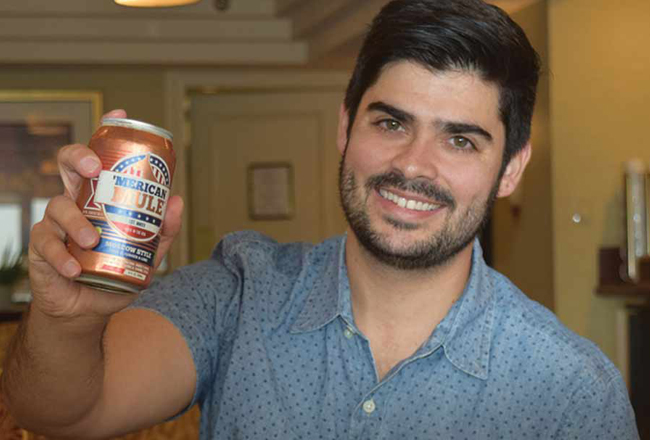Norwalk startup puts the Moscow Mule in an Americanized can

The cocktail known as the Moscow Mule first came on the scene in 1941 and, despite its Russian name, the mix of vodka, ginger beer and lime served in a copper mug was created in a Los Angeles bar. Legend has it that Academy Award-winning actor Broderick Crawford was the first person to taste it and it caught on with unusual speed ”” some liquor industry historians credit it with popularizing vodka among Americans. But after the 1940s it seemed to fall out of favor as other cocktails began to emerge.
Fast-forward to 2015 and UConn alumnus Dean Mahoney found himself with friends in a Santa Monica, California, bar called the Bungalow after a day”™s work in technology sales.
“We noticed all of these copper mugs were put out at the bar,” he said. “We realized Moscow Mule, the drink in that copper mug, was starting to re-emerge.”
Mahoney also noticed that the local bars were wildly inconsistent in their Moscow Mule mixology.
“Sometimes they were good, sometimes they weren”™t,” he said. “Either they were spicy or sugary. We wanted to make it for ourselves.”
Despite having no formal training in mixology, Mahoney turned the kitchen of his studio apartment into a laboratory for creating a consistent Moscow Mule formula that could be mass-produced.
“I was throwing yeast in 2-liter bottles and leaving it overnight, with huge explosions,” he admitted, adding that consultations with “some experts in the space” helped avoid combustible kitchen chaos and zero in on a winning formula.
“Seventy iterations and seven months later, we had the product,” he said, referring to the ready-to-serve cocktail branded ”™Merican Mule.
Mahoney and his partners in this venture, Steve Pawlik and Pete Weil, began self-financing and self-distributing ”™Merican Mule in California before the Miller Coors network agreed to pick up the product for distribution. Now the CEO of a new company, Mahoney moved back to Connecticut in 2018 and set up an East Coast headquarters for ”™Merican Mule in Norwalk, with co-founders Pawlik and Weil remaining in California to handle West Coast operations.
”™Merican Mule is manufactured in Missouri ”” ironically, the state best known for its mule population ”” and uses a corn-based vodka that is distilled four times and can be marketed as gluten-free. The product is sold in approximately 600 retail stores across California, Connecticut, Massachusetts and in Las Vegas, with plans to enter the New York market on Long Island and upstate locations in September.
While ”™Merican Mule is sold in an 12-ounce can, Mahoney does not market his product as a “canned cocktail,” arguing that the phrase is too broad.
“You can almost consider a ready-to-drink beverage a canned cocktail,” he said.
Due to the content of the product, ”™Merican Mule has relied heavily on experiential marketing rather than online promotions to attract buyers.
“We”™ve hired a network of beverage samplers and put them in retail stores,” Mahoney said. “We encourage people to try a small sample, and a lot of times people will buy it. Alcohol can”™t be sold online, but getting people on the ground supporting our retailers is important because it shows we”™re seeking to create awareness about the product. We also participate in food and brew events, which is a good way to let a lot of people try the product.”
Last month, ”™Merican Mule expanded its product line with two flavored additions that varied from the traditional recipe: The Tropical Style Mule made of rum, ginger and pineapple and the Mexican Style Mule consisting of tequila, ginger and lime. At the end of September, Mahoney will debut the Southern Mule, made with whiskey bourbon, ginger, orange and cherry.
“We”™ve developed north of six to eight additional mules,” he said. “Whether or when we”™ll release them is a little bit TBD, but there should be more coming out next year.”
Mahoney has fielded inquiries from other countries to import ”™Merican Mule, although he is putting off overseas sales until the national sales base is expanded. Due to its contents, the product is slapped with state liquor taxes, which vary between states, and Mahoney admitted this creates a slightly higher price point compared to other popular alcoholic beverages.
“We”™re passionate about creating something that”™s disruptive,” he said. “We felt we can make a great product that people would be willing to pay for, create a great experience and to be something a little bit different than your standard beer or wine.”